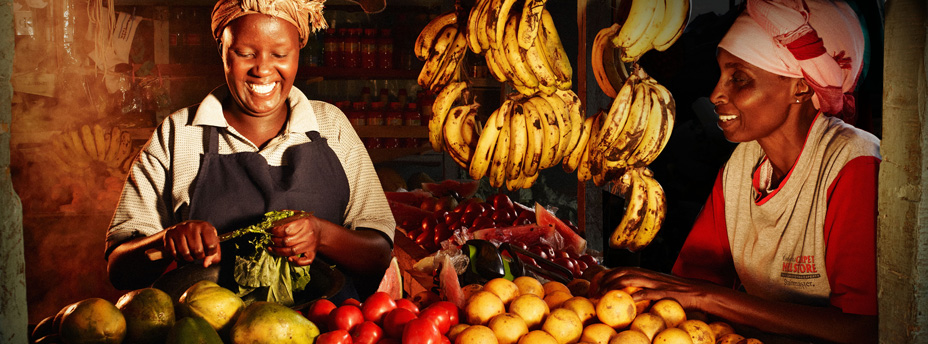In the News: In Kenya, A Solar Program Puts “Last-Mile” Consumers First

When her neighbor’s house burned down in a kerosene lamp accident, Risper Onyong’e understood that she, too, had to find an alternative. Married with one child, this rice farmer in a small village in Kenya faced the same challenges as her neighbors with no access to the electricity grid. Onyong’e’s family relied on dangerous and expensive kerosene-based lighting products. When kerosene was in short supply, her family endured total darkness after nightfall.
Recognizing the potential of women like Onyong’e to bring solar products to “last-mile” consumers such as her neighbors, Lighting Africa/Kenya launched a program to train local female entrepreneurs in the business skills they need to start or grow their own microenterprise. Thanks to that training, Onyong’e was among the first in her village to sell the Azuri solar products. The training, run by Lighting Africa/Kenya in collaboration with local civil society organization Practical Action, aims to engage women in the solar value chain as entrepreneurs and consumers.
Since its first pilot projects in Ghana and Kenya in 2009, Lighting Africa has enabled 20.5 million people across Africa to meet their basic electricity needs—lighting and mobile phone charging—through quality-verified off-grid solar products. The program operates in 11 countries, and aims to reach more than 250 million people by 2030.
Shining a Light on Business Opportunities
Onyong’e launched her microbusiness using PAY-GO (Pay-As-You-Go,) a mobile-money platform that lets consumers pay for the products in small installments—making the product affordable to all income groups. PAY-GO allowed Onyong’e to take the items without capital, offer them for purchase to neighbors in her village, and receive payment after sales.
After the training from Lighting Africa/Kenya, Onyonge added two new brands of quality-verified solar products to her stock. Her business grew quickly, and she soon enlisted her husband, who uses his motorbike, to deliver solar systems to homes. She sells an average of 13 solar units per month, for a total of around $3,250. Her sales margin is at an average of 8.7 percent, equating to about $280.
Onyong’e now employs three people and has saved enough money to buy a piece of land to build a house and to send their son to private school. With the additional solar product brands, her monthly income is expected to keep growing.
Off-Grid, On Target for Progress
Close to 600 million people in sub-Saharan Africa—about two-thirds of the population—live without access to grid electricity. This lack of modern energy services severely limits educational and economic opportunities and negatively impacts quality of life. Those without electricity often use polluting and expensive lighting sources that can cause serious problems, as Onyong’e saw from her neighbor’s fire.
That’s why Lighting Africa brings modern, high-quality lighting and energy products that offer a sustainable alternative to the off-grid population. As the program has evolved, its trainings have become an important offering to beneficiaries in search of economic opportunities, such as Onyong’e, who now offers lighting to her village.
“I learned sales and marketing techniques, how to keep records, and also learned the difference between products meeting Lighting Global Quality Standards and those of unknown quality,” she says. “I now know how to present myself and the more money I get, the harder I work.”
Lighting Africa is part of Lighting Global, a program that supports the growing global market for modern off-grid energy with a widely applicable, rigorous quality assurance framework. It involves testing of products for quality, durability, and truth-in-advertising. Since 2008, over 26 million Lighting Global quality-verified solar lighting products have been sold. More than 130 million people have benefited from using Lighting Global quality-verified solar lighting products.
To read more, visit www.lightingafrica.org.
Source: Impact at IFC

